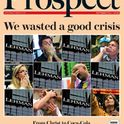Ellen Halliday, deputy editor: Last year, you wrote of your concerns about the future of protest and civil liberties in the UK and that the picture is worse today than it ever was in the past. What does the future look like?
Conor Gearty: For some time, I was saying: Let’s not be so obsessive about this or that legal change, because what matters is the culture. But we’ve developed a political culture which is resistant to protest as a legitimate means of drawing issues to the attention of the public, maybe because protest developed this idea of “direct action”—doing damage as a way of getting noticed, albeit not [damage] to people, which means the public don’t see it as terrorism. And protestors resort to direct action because, increasingly, “ordinary protest” was only permitted where it was ineffectual.
Imaan Irfan, editorial assistant: What do you make of the government’s current approach? The new crime and policing bill proposes criminalising face coverings at protests and allows police to impose conditions on public assemblies and one-person protests if they believe that the protest might intimidate people.
Conor: There is a “vast middle” whose votes are needed, and the vast middle feels—I think this is a Labour government judgement—that protest is irritating, and it’s something which needs to be stopped. [Labour is] feeding that middle set of biases. They’re not trying to show any leadership. They’re running to keep up with the lowest common denominator of middle covert authoritarianism.
Ellen: In recent weeks, we’ve had protests around asylum and against immigration. How do you explain the government’s approach there?
Conor: For the Labour government, what matters is getting re-elected. I imagine they have calculated that what appeals to the key voters is to go tough on climate and Palestine, but then to suddenly understand protest when it comes to hotels being stampeded. They’re trying to mimic the prejudices of key voters. Protest from the right has always been far more likely to be tolerated in this country, because it’s often about national values or the rule of law.
Imaan: There’s a lot of talk about withdrawing from the European Convention on Human Rights. What would the implications be for civil liberties in the UK?
Conor: The Human Rights Act could be repealed, followed by withdrawal from the European Convention on Human Rights, which will mean withdrawal from the Council of Europe.
If you want to shoot people in the Channel, or if you want to send them places where you know they will die, then you do need to leave the Council of Europe. English law, rather charmingly, doesn’t allow you to kill foreigners. So we need to have a parliament which passes a law authorising effective death. And these people will need to be arrested. It’ll be like the full scale ICE thing in the United States, and it won’t be just people who are here irregularly, it’ll be people of colour. As it has become in America, it’s going to be a framework for racism.
Imaan: Palestine Action has been proscribed as a terrorist organisation. More than 1,600 people have been arrested so far and at least 138 have now been charged with support for that group. Were you surprised by that?
Conor: I was very surprised that the [former] home secretary [Yvette Cooper], whose call it was, did it. The issue is preposterous.
It was the first time that they had extended the remit of terrorism to what we loosely call direct action. But criminal direct action is already a crime. [Palestine Action] is not exactly the IRA. It’s ludicrous to treat them as that.
The more ludicrous thing is that they found two groups nobody’s ever heard of [Maniacs Murder Cult and Russian Imperial Movement, which were proscribed alongside Palestine Action]. That, to me, gave the whole game away.
Ellen: Why did the government group Palestine Action with these organisations and say to MPs: Either they’re all proscribed or none of them are?
Conor: Nonsensical camouflage for the not-random, discriminatory act against [protest for] Palestine. It’s the chill factor. If you tell the police that it’s a crime to support Palestine Action, the police may regard people who support action on Palestine as people who are committing criminal offences. They have got a fantastic stick now with which to intimidate anti-genocide opinion.
Imaan: On that point, we’ve seen police threatening a protestor for carrying a flag and signs that said, “Free Gaza” and “Israel is committing genocide”. And then there was the man arrested for wearing a “Plasticine Action” T-shirt, who was later de-arrested. How clear cut is the law?
Conor: When Thatcher’s government banned Sinn Féin, the radio stopped playing music by the Pogues. Everybody lurches in the direction of protective over-interpretation. I have some sympathy with the police officers who over-interpret and then de-arrest. But part of the game is not to proceed with charges. The game is to disrupt. It’s sending a clear message that it’s high risk to protest about Palestine. And meanwhile, the starvation of the Palestinian people is becoming more and more evident.
There’s a massive gap between what people see and what authorities tell us matters. If I were to listen to authorities, I’d have to care more about the distress caused to some of my students by my pointing out that there’s starvation in Gaza, which is a war crime, than I do about the genocide. But all my students understand that’s nonsensical.
Ellen: Where do you see this going in a few years?
Conor: Reagan begat Thatcher, Clinton begat Blair. Who does Trump beget? I am pessimistic, not about the Labour administration, but about what comes after. Our political system is ridiculous, and it’s no longer quaint that you can [under first-past-the-post] get complete control on 34 per cent of the vote.
If either Farage or the Conservatives in some post-Kemi Badenoch iteration win, they would aggressively pursue Trump-like policies. That would include the militarisation of the policing of protest and clear directives to the authorities to act aggressively. It would include mass arrests, often, I think, with violence.
In the later period of the Conservative administration, the government asked the Metropolitan Police commissioner to ban a protest march. To his enormous credit, he pointed out that he couldn’t, because there wasn’t a basis in law for the ban. In the post-2029 scenario, will he be sacked, and will somebody who’s on GB News be put in as chief of police?
I have thought a good bit about what government could do to fortify democracy against the forthcoming fight. Change the voting system. Don’t have a stupid internal independent commission. Don’t have some stupid Royal Commission. Don’t consult. Just have a Single Transferable Vote PR Act. Push it through.
You would ban foreign influence on elections. And you would not allow [Paul] Marshall to run a whole lot of outlets [UnHerd, the Spectator, GB News] in pursuit of an obvious and transparent political agenda.
Ellen: How would you stop that?
Conor: It’s called parliamentary sovereignty. It’s called legislation. It’s called having will. There used to be a requirement that all media was balanced. Return to it. A lot of this is recover what Mrs Thatcher began shredding. The community that benefited from the end of the Cold War destroyed many of the social entitlements initially, and now they’ve turned to the civil and political. They’re seeking to perpetually empower themselves, but we can fight back.
The Telegraph would scream; there would be front page headlines on the Mail; the Times would shed some of its alleged balanced reportage. So what? Let’s have some fights with the right enemies. And if you go down, you go down.
That strikes me as a more attractive set of scenarios than simply surrendering on the basis that you didn’t achieve some growth that you set out to achieve for 2029.
This is an excerpt of a longer interview that has been edited for clarity and length. To listen to the full podcast on Spotify or Apple Podcasts, click here.












